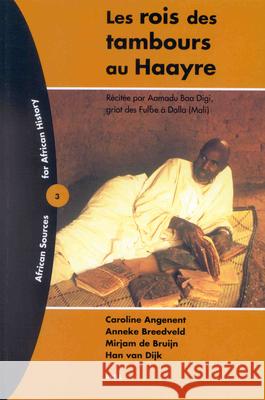Les Rois Des Tambours Au Haayre: Récitée Par Aamadu Baa Digi, Griot Des Fulbe À Dalla (Mali) » książka
Les Rois Des Tambours Au Haayre: Récitée Par Aamadu Baa Digi, Griot Des Fulbe À Dalla (Mali)
ISBN-13: 9789004124462 / Francuski / Miękka / 2002 / 182 str.
The text in this volume covers a large period. It runs from the intensification of Islamic teaching during the reign of Alu Maana, to the struggles and intrigues at the court when Seeku Aamadu reigned over the neighbouring Islamic emirate of Maasina, to the French colonial regime. During the latter episode, a lot of attention is given to the manipulation of the appointment of rulers and the subsequent decline of their power under Modibo Keita and Moussa Traore in independent Mali. This interference of the French has resulted in doubts about the legitimacy of the kings, which is symbolized by the royal drums that are no longer played upon. The political developments involving the foundation of two parties by the Malian state, further diminished the role of the leaders of the Haayre as mediators for their people. This development is embodied in the final sentence of the text when Aamadu Baa Digi desperately concludes that "Jamaa oo, haya joonin, kaanankoo'be mon 'be, laamu walaa," which was translated as "Peuple, maintenant, vos rois, ils n'ont plus de pouvoir." A team of researchers from different disciplinary backgrounds (forestry, anthropology, linguistics, religious studies) has provided commentary on the social, cultural, geographic, ecological, political, linguistic and religious context of this text. An account is also given on the production and the producer of this text recited so vividly by Aamadu Baa Digi.











